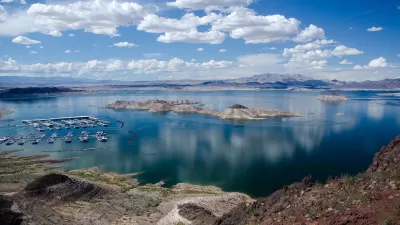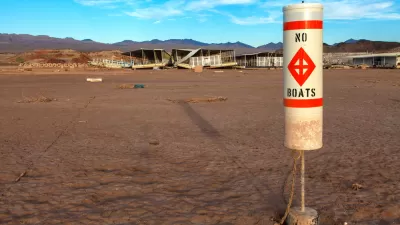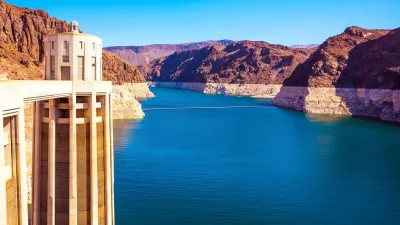State officials claim a proposal agreed upon by the other six states using Colorado River water disproportionately impacts California farmers.

Reporting for the Los Angeles Times, Ian James outlines California’s alternate proposal for managing the Colorado River’s dwindling water resources. “The state put forward its proposal a day after Arizona, Colorado, Nevada, New Mexico, Utah and Wyoming released their alternative.”
California officials claim the state’s “high-priority senior water rights dating back more than a century” must be protected under any new agreement. According to California’s natural resources secretary Wade Crowfoot, “The six-state proposal directly and disproportionately impacts California.” Much of the Colorado River’s Southern California allocations go to the region’s vast farmlands. Per the six-state plan, “A large portion of the cuts they proposed would be made by accounting for evaporation and other water losses along the lower portion of the river — a calculation that would translate into especially large reductions for California, which uses more Colorado River water than any other state.”
As James explains, “The state’s proposal builds on a previous commitment by four Southern California water agencies to cut water use by 400,000 acre-feet per year, a reduction of about 9%, through 2026. The federal government has asked the states to reduce their total usage by 2 to 4 million acre-feet.” California officials call the proposal “a realistic and implementable framework to address reduced inflows and declining reservoir elevations by building on voluntary agreements and past collaborative efforts in order to minimize the risk of legal challenge or implementation delay.” As the states continue to debate, federal officials plan to finalize an agreement this summer.
FULL STORY: California offers proposal on Colorado River crisis, disagreeing with six states

Alabama: Trump Terminates Settlements for Black Communities Harmed By Raw Sewage
Trump deemed the landmark civil rights agreement “illegal DEI and environmental justice policy.”

Study: Maui’s Plan to Convert Vacation Rentals to Long-Term Housing Could Cause Nearly $1 Billion Economic Loss
The plan would reduce visitor accommodation by 25% resulting in 1,900 jobs lost.

Planetizen Federal Action Tracker
A weekly monitor of how Trump’s orders and actions are impacting planners and planning in America.

Waymo Gets Permission to Map SF’s Market Street
If allowed to operate on the traffic-restricted street, Waymo’s autonomous taxis would have a leg up over ride-hailing competitors — and counter the city’s efforts to grow bike and pedestrian on the thoroughfare.

Parklet Symposium Highlights the Success of Shared Spaces
Parklets got a boost during the Covid-19 pandemic, when the concept was translated to outdoor dining programs that offered restaurants a lifeline during the shutdown.

Federal Homelessness Agency Places Entire Staff on Leave
The U.S. Interagency Council on Homelessness is the only federal agency dedicated to preventing and ending homelessness.
Urban Design for Planners 1: Software Tools
This six-course series explores essential urban design concepts using open source software and equips planners with the tools they need to participate fully in the urban design process.
Planning for Universal Design
Learn the tools for implementing Universal Design in planning regulations.
Caltrans
Smith Gee Studio
Institute for Housing and Urban Development Studies (IHS)
City of Grandview
Harvard GSD Executive Education
Toledo-Lucas County Plan Commissions
Salt Lake City
NYU Wagner Graduate School of Public Service





























